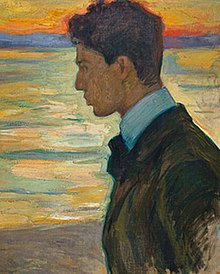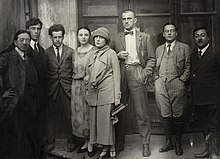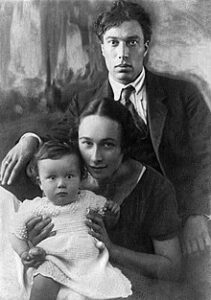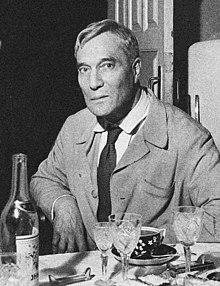One of the few word masters to get the Nobel Prize is Boris Leonidovich Pasternak. His translations and poetry can be found in the vast collection of foreign and Russian literature.
On January 29, 1890, Boris Pasternak was born in Moscow into a well-educated family. Before Boris was born, the family relocated to Odessa, where his mother, a pianist, started her career. Father is an artist and Academy of Arts member. A well-known art patron bought several of his paintings for the Tretyakov Gallery. Lev Nikolaevich Tolstoy was pals with Boris’s father, who also contributed illustrations to his novels. The family had three more children after Boris, who was the firstborn.
The poet was surrounded by artistic people since he was a little child. Various celebrities were welcome to visit the parental house. Leo Tolstoy, the composers Scriabin and Rachmaninov, the artists Ivanov, Polenov, Nesterov, Ge, Levitan, and other well-known figures were among the honored guests. The future poet could not help but be influenced by their communication.
For the boy, Scriabin was a great authority figure. The composer inspired him to pursue a career in music and he developed a lifelong enthusiasm for it. Boris excels academically and receives a gold medal upon graduating from high school. He studies at the conservatory concurrently.
Throughout his biography, Pasternak faced numerous circumstances that required him to make difficult decisions. The first of these choices was giving up on a musical career. Years later, he uses the absence of absolute pitch to explain this circumstance. He was efficient and well-intentioned, bringing whatever he touched to flawless completion. Boris came to the realization that he would never be able to achieve greatness in the music industry, even with his unending passion for it.
He enrolled in Moscow University’s Faculty of Law in 1908, and a year later, he was moved to the philosophy division. Having excelled in every subject, he enrolled in the University of Marburg in 1912. Although Pasternak’s job in Germany is supposed to be prosperous, he unexpectedly chooses to pursue a career in poetry instead of philosophy.
Initial stages of creativity
The pen was originally attempted in 1910. His earliest poems were composed while he was in Venice with his family and was experiencing his adored girl’s rejection. Although these poems were written for youngsters, one of his coworkers claims that they have deep meaning. He joins the literary groups “Lyrika” and “Musaget” after moving back to Moscow, where he reads his poetry. Initially drawn to futurism and symbolism, he eventually decides to follow a different route unrelated to literature.
The years 1913–1914 were jam-packed with innovative happenings. A collection of his poetry titled “Twin in the Clouds” as well as several of his individual poems have been published. However, the poet has high standards for himself and believes that his works fall short. He first made the acquaintance of Mayakovsky in 1914, and Pasternak was greatly influenced by the latter’s inventiveness and fortitude.
In 1916, Boris Zbarsky, the manager of chemical industries, extends an invitation to Pasternak, who is living in the Perm district in the Ural settlement of Vsevolodo-Vilva. works as a commercial correspondence assistant in an office, handling financial reporting and commerce. Many people believe that Yuryatin from the well-known book “Doctor Zhivago” is the model for Perm. stops by the Kama soda factory, Berezniki. Inspired by what he witnessed, he refers to the facility and the settlement erected around it as “little industrial Belgium” in a letter to S.P. Bobrov.
Creation
Being creative is an incredible process. While it may be simple and enjoyable for some, it can be difficult and demand a lot of work to reach the desired outcome and attain excellence for others. Boris was a member of the second group. He puts a lot of effort into refining his rhymes and phrases. His first literary accomplishment, in his opinion, was the 1922 publication of the collection “My Sister is Life.”
One intriguing aspect of his life story was his friendship with Sergei Yesenin, a critic of Pasternak’s writing. Their relationship developed into an outright conflict as a result. A quarrel broke out between the poets one day. In his fascinating memoirs, Kataev refers to Pasternak as “the mulatto” and Yesenin as “the prince.”
A lot of significant things happened in the 1920s, including the parents’ emigration to Germany, their marriage to Eugenia Lurie, the birth of a son, and the release of new poetry collections and anthologies.
Soviet leadership
The authorities acknowledged Pasternak and his efforts in the early 1930s. Poem collections are reprinted every year, and he delivered a speech at the Writers’ Union Congress in 1934. regarded as the greatest poet in the Soviet Union. He traveled to Paris in 1935 to attend the International Congress of Writers. He had a nervous breakdown throughout the trip; the writer laments sleeplessness and strained nerves.
Pasternak defended Anna Akhmatova’s son and husband that same year; they had been detained but were freed due to Pasternak’s correspondence with Stalin. The poet handed Stalin a book containing translations of Georgian poets’ lyrics as a present in December 1935 as a token of appreciation. He expresses gratitude for the “lightning-fast release of Akhmatova’s relatives” in the letter that goes with it.
Two of his poems praising I.V. Stalin were published in January 1936. Pasternak’s support of Gumilyov and Mandelstam, as well as his intervention on behalf of Anna Akhmatova’s relatives, were not forgiven by those in positions of authority, despite their best attempts. He was essentially shut out of the literary community in 1936 after being charged with having a false worldview and being detached from reality.
Interpretations
In addition to becoming well-known as a poet, Pasternak was also a brilliant translator of poetry from other languages. By the late 1930s, the nation’s elite had a different take on him, his writings were not reprinted, and he was on the verge of financial ruin. The poet is forced to use translations as a result. Pasternak handles them like independent artistic creations. He takes extra care in his work and strives for perfection.
In 1936, he started translating in his Peredelkino dacha. Pasternak’s creations are regarded as being on par with the original masterpieces. For him, translating becomes a means of realizing his poetic potential as well as a means of providing for his family in times of persecution. Shakespeare translated by Boris Pasternak are now considered classics.
Fighting
Owing to trauma experienced as a child, he is not mobilizable. The poet was likewise unable to move aside. After finishing the school, he gains the title of war journalist and leaves for the front lines. Upon his return, he composes a series of patriotic lyrics.
He put in a lot of labor in the years following World War II, translating as it was his sole source of money. He doesn’t create much poetry; instead, he spends all of his time translating books, composing novels, and translating Goethe’s Faust.
One of the poet’s most important prose pieces is “Doctor Zhivago,” a book he spent ten years writing that is essentially autobiographical. Zinaida Pasternak, his wife, served as the model for the novel’s protagonist (Neuhaus). After the poet met Olga Ivinskaya, who became his new muse, the book was completed considerably more quickly.
The story of the book starts at the turn of the century and concludes with the Great Patriotic War. The book’s title evolved while it was being written. It was dubbed “Boys and Girls” at first, then “The Candle Was Burning,” and finally “There is No Death.”
The author faced intense persecution because of his accurate account of those years’ events and his own perspective on them, and the government of the nation refused to acknowledge Doctor Zhivago. Although the Soviet Union did not publish the book, it was well-received overseas. Readers gave the 1957 Italian publication of Doctor Zhivago a flurry of positive reviews, and the book quickly gained popularity.
Pasternak received the Nobel Prize in 1958. The book is published in Germany, Great Britain, and Holland and is translated into several languages. It is disseminated globally. The novel gained popularity despite the Soviet authorities’ repeated attempts to confiscate the manuscript and outlaw it.
His greatest happiness and sadness coincide with the world community realizing how talented a writer he is. Bullying from coworkers as well as from authorities is getting worse. Rallies accusing people are arranged at factories, institutions, creative unions, and other establishments. A group of letters is composed requesting that the offending poet be penalized.
The poet was offered the chance to be banished from the nation, but he could not bear the thought of leaving it behind. His unpleasant experiences during this time are expressed in the 1959 poem “Nobel Prize,” which was also released internationally. He was nearly charged with treason for his verse, and he was compelled to decline the medal due to pressure from a widespread campaign. Although Boris Leonidovich is kicked out of the USSR’s Union of Writers, he stays in the Literary Fund, keeps publishing, and gets royalties.
Verses
The early period’s poems clearly show the impact of symbolism. They are distinguished by intricate rhymes, illogical imagery, and analogies. His poetry undergo a significant transformation throughout the conflict, becoming more readable, intelligible, and light in tone. This is particularly true of his short poems, such “March,” “Wind,” “Hop,” and “Hamlet.” The greatness of Pasternak lies in the fact that even his little poems have deep philosophical implications.
Written in 1956, the piece reflects his final years of life and career while at Peredelkino. Even while his early poems were exquisite, they eventually developed a social orientation.
The oneness of nature and man is the poet’s favorite theme. A great example of landscape lyricism, “July” captures the essence of one of the most picturesque months of the year.
His most recent collection will feature the 1957 poetry “It’s Snowing.” Two sections make up the work: a sketch of a landscape and philosophical musings on the meaning and fleeting nature of existence. The phrase “and the day lasts longer than a century” from his 1959 poetry “The Only Days,” which is also featured in the most recent collection, will serve as the catchphrase.
Individual existence
Without discussing Boris Pasternak’s personal life, a biography of him would not be complete. The poet was married twice: once as a young man and again as an adult. There was a third love for him.
Every one of his women was a muses, a source of joy, and content with him. Personal interactions became unstable due to his overflowing emotions and innovative, energetic temperament. He could not be faithful to just one lady, but he did not descend to betrayal.
Eugenia Lurie, his first wife, was an artist. When he first saw her in 1921, he saw significance in their encounter. Pasternak finished the story “Childhood of Eyelets” during this time, with the heroine embodying the idea of the emerging artist. Eugenia was the name of the work’s heroine as well. She possessed an unexpected combination of self-sufficiency, purposefulness, and a delicate, sensitive, and sophisticated personality. She ends up becoming both his muse and wife.

The poet experienced an incredible boost as a result of meeting her in his soul. Boris was overjoyed when their first child, a son named Evgeniy, was born. Early on in their marriage, a strong sense of mutual affection helped to ease the challenges; nevertheless, as time went on, the struggles and poverty of the 1920s also had an impact on the family’s well-being. Pasternak assumed part of the family’s responsibilities as Eugenia also aimed to fulfill her potential as an artist.
As the poet started writing to Marina Tsvetaeva, their relationship soured and his wife became enraged, departing for Germany to see Pasternak’s parents. She would eventually give up on discovering her creative potential and focus only on her family. But Zinaida Neuhaus had become the poet’s new girlfriend at this point. She is 32 years old, he is forty years old, and she has two kids and a spouse.
In every way, Neuhaus differs from his first wife. She is a good homemaker who gives her family her whole attention. He fell in love with her right away, even though she wasn’t as sophisticated as his first wife. The poet is determined to stay with his chosen one despite everything, even if it means marriage and kids. Pasternak continued to support and stay in touch with his old family even after they were split up.
Additionally pleasant was the second marriage. A devoted wife brought comfort and tranquility to the workplace. Leonid, the poet’s second son, was born. Similar to his previous spouse, contentment persisted for slightly over a decade. Subsequently, the spouse started to stay longer in Peredelkino and distance himself from the family. In the editorial office of New World magazine, he meets Olga Ivinskaya, the magazine’s new editor, against the backdrop of deteriorating family relations.
Boris made several attempts to end his relationship with Olga since he did not want to leave his wife. Due of her friendship with the discredited poet, Ivinskaya was imprisoned in 1949 and spent five years in camps. He has taken care of her and provided for her children over the years, aiding her mother in both ways.
He suffers health consequences from the incident. He had a heart attack in 1952 and had to be admitted to the hospital. Olga serves as Pasternak’s unofficial secretary after leaving the camps. For the remainder of his life, they remain together.
Death
His health was compromised by public and professional harassment. Pasternak became seriously ill in April 1960. It was stomach metastases from oncology. Zinaida is stationed next to his bed at the hospital.
He learns at the start of May that the illness is terminal and that he must be ready to pass away. May 30, 1960 was his death date. In six years, Zinaida will die, and her cause of death is the same as Pasternak’s.
Many attended his burial even though the authorities weren’t very cordial. Naum Korzhavin, Andrei Voznesensky, and Bulat Okudzhava were a few among them. His tomb can be found in the Peredelkino cemetery. There is a grave for the entire family. The sculptor Sarah Lebedeva is the creator of the memorial near Pasternak’s grave.
